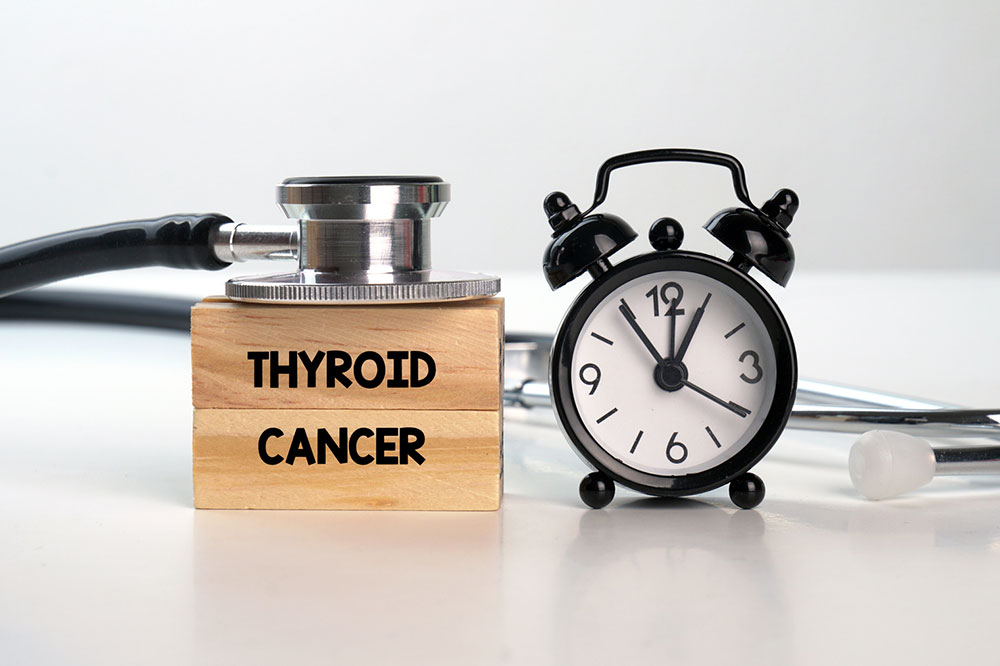Hidden Signs of Thyroid Cancer

Thyroid cancer starts in the thyroid gland, a small organ located in the neck. It can occur in people of all ages but is more common in women and people over 60. The exact cause of thyroid cancer is unknown, but factors such as exposure to radiation or family history may increase the risk. Treatment options include surgery, radiation therapy, and hormone therapy. Awareness of thyroid cancer’s signs can help with early detection and treatment.
Trouble swallowing
The most characteristic sign of thyroid cancer is a lump or swelling in the neck. In some patients, this can cause trouble with swallowing. Dysphagia, another name for this problem, is when a person has a hard time getting food or liquids from their mouth to their stomach. The gland’s tumor may enlarge to the point where it presses against the esophagus or windpipe, making it difficult to gulp down and causing a sense of fullness in the throat. Benign thyroid nodules are one condition that can make swallowing difficult. It should be noted that such problems are uncommon because the nodule must be sufficiently large and situated in a way to obstruct normal food flow. The Centre for Disease Control and Prevention states that difficulty swallowing without any other accompanying illnesses or conditions might occasionally be an indication of thyroid or throat cancer.
Difficulty breathing
Breathing difficulty is not a common symptom of thyroid cancer but can be a hidden sign that some people with this disease experience. In rare cases, a tumor in the thyroid gland can grow large enough to compress the windpipe or trachea, which can obstruct smooth airflow. Severeness of shortness of breath can vary depending on the size and location of the tumour and it can range from mild discomfort to severe respiratory distress. Signs can include shortness of breath, wheezing, coughing, chest tightness, and a feeling of suffocation or choking. Patients with thyroid cancer occasionally report feeling as if they are breathing through a straw. Difficulty in breathing can be a medical emergency, and it is important to seek immediate medical attention in such a situation.
Voice hoarseness
The voice becoming hoarse is due to the tumor pressing against the nerves that control the voice box or larynx. The thyroid gland is located near the voice box; hence, as the tumor grows, it can compress the vocal cords or the recurrent laryngeal nerve, which causes changes in the voice. The recurrent laryngeal nerve is a branch of the vagus nerve that controls the muscles of the voice box. In addition to compressing the recurrent laryngeal nerve, the thyroid tumor can also directly invade the vocal cords or surrounding tissues resulting in further changes in the voice. The hoarseness can also be due to the tumor interfering with the normal vibration of the vocal cords, which is necessary for speech.
Mild ear pain
Thyroid cancer does not typically cause ear pain, as the thyroid gland is located in the neck and not in proximity to the ears. However, there are some potential ways in which the tumor could indirectly lead to ear pain:
Compression of nearby structures
If the tumor grows or spreads to nearby structures, such as the trachea or esophagus, it will compress nerves in the area and cause referred pain that is felt in the ears. This happens because the nerves that supply the thyroid gland also go to the ears.
Metastasis
In rare cases, thyroid cancer may spread to other parts of the body, such as the bones, and cause pain in those areas, which could include the ears.
Treatment side effects
Thyroid tumor treatments such as radiation therapy, may have side effects that include pain in the ears or other parts of the head and neck.
Persistent coughing
Persistent coughing is not typically considered a symptom of thyroid cancer, as the thyroid gland is not directly involved in respiratory function. According to the American Cancer Society, a persistent cough without any other cold-like symptoms may be a sign of thyroid cancer. However, there are some potential scientific explanations for coughing related to thyroid cancer.
Any cough that appears suddenly and isn’t accompanied by a runny nose, chest congestion, or phlegm deserves special attention.
One possibility is that thyroid cancer has spread to the trachea, which is the tube that connects the lungs to the throat. In some cases, the cancer cells can grow into the trachea and cause irritation, inflammation, or obstruction. This can result in a persistent cough, as the body tries to clear the airways and remove the irritants.
Another potential explanation is that the tumor causes compression of nearby structures, such as the esophagus, which is the tube that carries food from the mouth to the stomach. If the esophagus is compressed, it can lead to difficulty swallowing, which may cause coughing and choking as the body tries to clear the blockage.
Many musculoskeletal disorders (msk) are also associated with thyroid cancer, which manifests as pain, cramps, stiffness, easy fatigue, and weakness.



